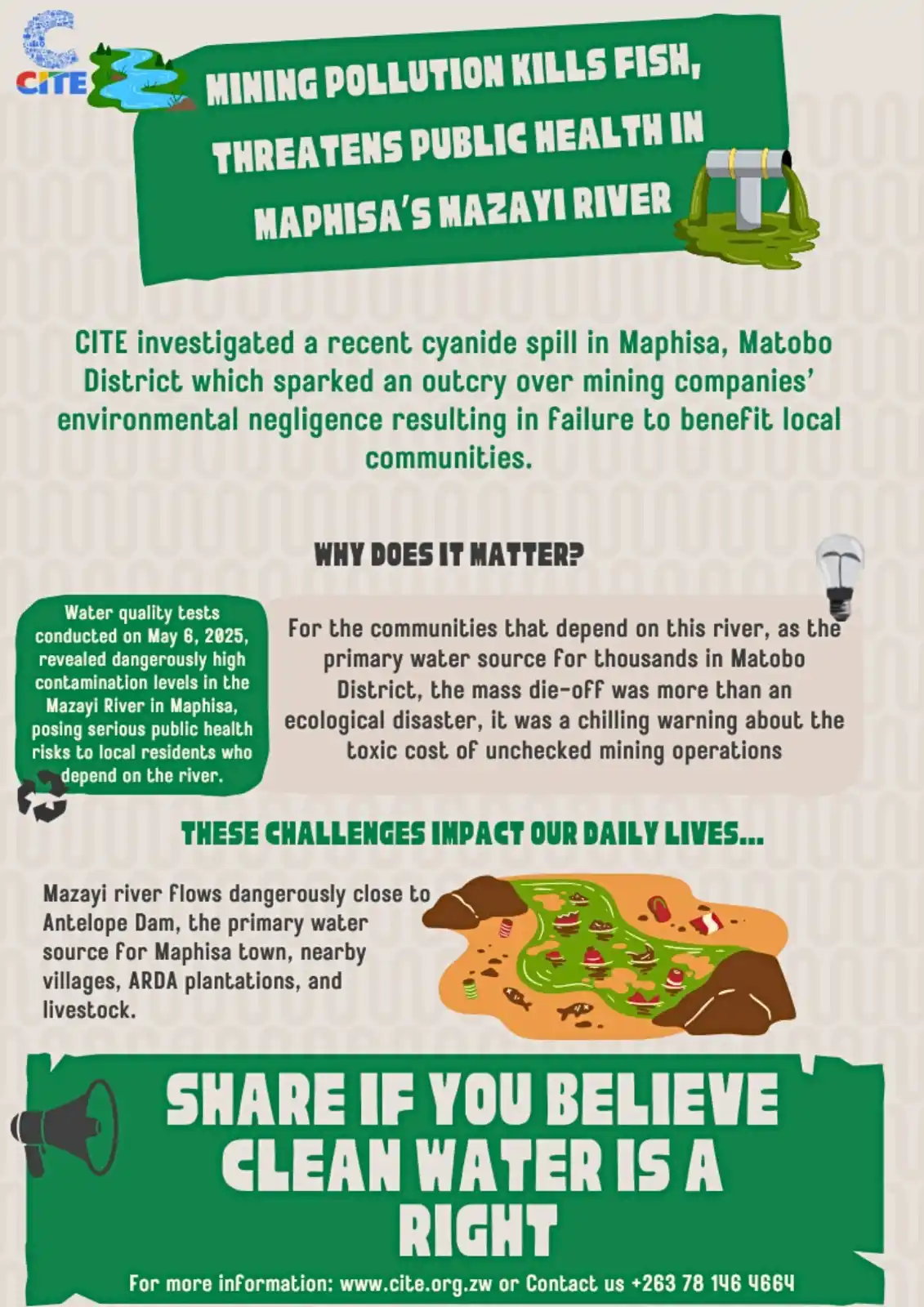
CITEZW
121 subscribers
About CITEZW
CITEZW is the go to online media house for all your up to date news and current affairs programs https://cite.org.zw
Similar Channels
Swipe to see more
Posts

https://cite.org.zw/how-to-keep-chicks-healthy-and-growing-during-winter/. As winter sets in, poultry experts are advising farmers to exercise caution during the chick brooding stage to ensure healthy growth and prevent disease outbreaks. Brooding is a critical phase in poultry production where young chicks are cared for before being moved to the grower stage. Experts say that proper management during this period is essential for reducing mortality and ensuring strong growth. Dr Enoch Machingauta, a poultry specialist at Econutrivet, stressed the importance of adequate preparation and close attention to detail during the cold season. “During winter, farmers must gather the right materials for brooding, such as charcoal, clay pots, stoves, and warm bedding—ideally up to 10cm thick,” he said. “Infrared lights should be installed, feed should be in place, and most importantly, measures must be taken to block cold winds.” Dr Machingauta advised farmers to manage ventilation carefully, warning that poor airflow can lead to the buildup of ammonia, which poses serious health risks to chicks. “When closing the brooder, leave the top open all around—about 15 to 20cm—to allow fresh air to enter and let harmful gases escape,” he explained. “If not managed well, the accumulated ammonia can cause breathing difficulties, leading to those ‘kroo kroo’ respiratory sounds.” He warned that inadequate ventilation can affect both the upper and lower respiratory tracts of chicks, causing stress that can hinder feeding and result in stunted growth. “Stress in chicks reduces their appetite, and that lack of nutrition compromises growth,” he said. Dr Machingauta also cautioned against the risk of ascites, commonly known as water belly, which becomes apparent in older chicks. “This condition arises when oxygen fails to reach the blood and organs properly due to poor brooding conditions,” he said. “Water is not absorbed effectively into the cells, and the result is swelling that could have been avoided with proper early management.” He emphasised the importance of hygiene and disease prevention, urging farmers to use recommended treatments from the start. “Farmers should administer Endocox during the first week. This helps the chicks build resistance to diseases,” said Dr Machingauta. “And avoid using cloths or blankets as bedding material—they retain moisture and contribute to unsanitary conditions.” Dr Machingauta concluded by encouraging farmers to invest time and care during the brooding stage to improve outcomes. “Don’t cut corners. Your effort in the beginning determines your results in the end,” he said. *Independent journalism takes time, resources, and dedication,* *but we do it because your perspective matters.* *Support our work. Donate today* : *https://cite.org.zw/support-local-news/*

https://cite.org.zw/zanu-pf-government-pursuing-nguni-ndebelephobic-policies/. The recent hysterical attacks by Chris Mutsvanga, and the Minister of Local Government and National Housing against His Worship the Mayor of Bulawayo, David Coltart whose purported crime was entertaining Collin Bulelani Khumalo, Great Grand Son of King Lobengula, could not only go unchallenged, but also necessary to expose ZANU PF’s Nguni/Ndebelephobia. Collen Bulelani Khumalo incident should not be taken as an isolated political mishap, but a broader political strategy adopted by ZANU. The strategy is multi-pronged involving physical extermination of a specific ethnic group e.g. Gukurahundi massacres of the Ndebeleas a first phase, social re-engineering among other phases involving deculturisation of the Matabele. This is already in motion, for example, deployment of primary and secondary school teachers and other public servants who can’t speak local languages in Matabeleland and other areas dominated by Ndebele speakers. From the first nationalist movements, the Southern Rhodesia African National Congress, the National Democratic Party and Zimbabwe African People’s Union, people were united and behind the rallying slogan of ‘Mwana Webvu/Mntwana Wenhlabathi”. In fact, the nationalist politics of the day, were focused on the struggle against the supremacist regimes not on ethnicity. This monumental achievement was shred into bits and pieces of politics of hate and tribalism by ZANU after it split from ZAPU. Nothing wrong with political splits, they are a universal menu of any political dispensation and healthy for democracy. However, what matters are policies pursued after splitting, particularly when state power is acquired. For example, Kenneth Kaunda’s UNIP split from the Northern Rhodesia African National Congress and went on to govern the new post colonial state of the Republic of Zambia. On acquiring state power, Kaunda rallied all people of diverse ethnic persuasion including the Ngoni/Nguni around the slogan “One Zambia One Nation” and removed provincial names denoting ethnicity, for example, Barotseland was renamed Western Province. Compare with Mugabe, he retained all colonial provincial names denoting tribal identities, what followed was unresolved Matabele massacres. ZAPU’s national executive and central committees consisted mainly of Shona speaking members but only Ndebele speakers were targeted for repression, only George Marange suffered with his Ndebele colleagues. This defies logic, decision making involves collectivity, but why were the Ndebele speaking members selected for repression? The answer is simple, ZANU PF operates unwritten political rules (conventions). Conventions are unwritten or uncodified rules of political practice but which are obeyed on equal measure with written laws. ZANU PF adopted a convention that stipulated exclusion of Nguni/Ndebele extraction or associated with the same from the presidency of a political party or country but only for deputyship. This has even found expression with opposition political formations. The creation of a further 2 vice presidents and ultimate appointment of Elias Mudzuri and Nelson Chamisa by late Morgen Tsvangirai in addition to the incumbent Thokozani Khuphe elected in a congress of the MDC-T was an undisguised conformity to the convention. Her ethnic background road blocked her chances of becoming the party presidentor country if elections were won. To conclude, Nguni human species are spread all over Southern Africa, Botswana, Malawi, Mozambique, South Africa, Tanzania, Zambia and Zimbabwe, all are safe in those countries,except in Zimbabwe where they are under siege and an endangered species as was demonstrated by Gukurahundi Massacres. Those who survived genocide, are undergoing some form of deculturisation and language genocide. Therefore, it would be naïve for any right-thinking person to believe that this hatred is spared for Ngunis of Zimbabwean nationality only, but the entire Ngunis of the SADC Region. Siziba is the ZAPU Secretary for the Bulawayo Province. He writes in his personal capacity. We welcome your feedback, suggestions and comments. Contact us via our whatsapp number (263) 0781 464 664 You can also follow link to join our Whats App community https://chat.whatsapp.com/FwxZ4uMTgIV8KlFV5cX4EW

🔵INVESTIGATION: Dead Fish, Dirty Water, Silent Authorities Villagers in Matobo District say cyanide from nearby mines poisoned their main water source. Would you drink the water if this happened in your town? READ the full story: https://cite.org.zw/mining-pollution-kills-fish-threatens-public-health-in-maphisas-mazayi-river/. *Independent journalism takes time, resources, and dedication,* *but we do it because your perspective matters.* *Support our work. Donate today* : *https://cite.org.zw/support-local-news/*


https://cite.org.zw/councillor-dumps-ccc-to-contest-insiza-north-by-election-as-independent/. Ward 15 Insiza South Councillor, Lesley Dube, has announced his candidacy as an independent in the upcoming Insiza North by-election. The seat fell vacant following the death of Farai Taruvinga who was the MP since 2015 on a Zanu PF ticket. The Zimbabwe Electoral Commission (ZEC) announced that the nomination court will sit on 15 May and the by-election will be held on 14 June 2025. Dube was elected as a councillor under the Citizens Coalition for Change (CCC) during the 2023 harmonised elections. However, he has now opted to run without party affiliation, citing challenges within the CCC. “Since there have been numerous issues with CCC and the brand is currently struggling, I plan to run as an independent candidate,” said Dube. He acknowledged that the decision was not taken lightly and came after considerable reflection. “I have received advice to stand as an independent, but I’m doing so with a heavy heart,” he said. “It is my hope that party leaders will eventually sit down and resolve the issues. I would have loved to stand under my party, but the situation on the ground is not conducive.” Dube said his decision to run for Parliament was informed by the work he has done at ward level and growing calls from constituents for him to expand his impact. “I have made the decision to run for MP because I have been doing a lot of good work as a councillor for Ward 15, and my voters are telling me I should do even more,” he said. During his tenure as councillor, Dube said he gained insight into the challenges affecting the broader Insiza North district and is now seeking to address them at a higher level. “I would like to work with fellow councillors in the constituency and help them develop their areas,” he said. “I want to take that spirit to the constituency and cover all the wards in Insiza North because I’ve done great work in Ward 15.” If elected, Dube said he will prioritise improving the constituency’s poor infrastructure. “I will be working hard to bring improvements, because there are no roads, very few schools and clinics, and the infrastructure is generally poor,” he said. He also disclosed that he will self-fund part of his campaign, but is open to support. “I am financially secure because I work as a miner in Filabusi, but I am also open to donations from anyone who wishes to help,” said Dube. He added that he is open to collaborating with members across the political divide if they are committed to development. “As long as it involves development, I am willing to collaborate with any Member of Parliament,” he said. *Independent journalism takes time, resources, and dedication,* *but we do it because your perspective matters.* *Support our work. Donate today* : *https://cite.org.zw/support-local-news/*

https://cite.org.zw/ibhetshu-likazulu-remembers-the-21-mothers-burned-alive-during-gukurahundi/. Ibhetshu LikaZulu has issued an emotional tribute to the 21 women who were burned alive in Emkhonyeni, Tsholotsho, on 16 March 1983 during the Gukurahundi genocide, appealing for public acknowledgement, justice and memorialisation of the victims. This reminder comes as the world celebrated Mother’s Day on 11 May, honouring the sacrifices and love of mothers. However, for Ibhetshu LikaZulu, the day also brought back devastating memories of how “innocent” women, daughters, and sisters, were slaughtered in a “calculated act of extermination”. The 1983 massacre in Emkhonyeni stands as one of the most brutal episodes of the Gukurahundi genocide, where an estimated 20 000 civilians were killed by the North Korean-trained Fifth Brigade between 1983 and 1987. The 21 women were reportedly locked in a hut and set ablaze. Ibhetshu LikaZulu’s Secretary-General, Mbuso Fuzwayo said these women were Sikhangezile Msipha, Deliwe Ndlovu, Concilia Ncube, Sikhathele Ndlovu, Masalu Ndlovu, Senzeni Sibanda, Betty Sibanda, Singatsho Sibanda, Musa Ncube, Elitha Ngwane, Eva Tshuma, and others, who he lamented remain largely absent from Zimbabwe’s official history. In a statement released on May 11, Fuzwayo, said the commemoration of Mother’s Day must also confront Zimbabwe’s unresolved history of state-sponsored violence, particularly the atrocities committed against women during the Gukurahundi era. “On this Mother’s Day, Ibhetshu LikaZulu extends heartfelt solidarity and reverence to all mothers in Zimbabwe and across the world,” Fuzwayo said. “Today, we celebrate the courage, resilience, and unwavering love of mothers who continue to defy all odds to nurture, protect, and provide for their children and families, often under dire circumstances shaped by Zimbabwe’s ongoing economic collapse, a direct result of decades of misrule by the Zanu PF regime.” He painted a grim picture of the daily struggles Zimbabwean women endure daily while condemning the state’s refusal to acknowledge past atrocities. “In the face of spiraling inflation, joblessness, and systemic neglect, Zimbabwean mothers stand as the last line of defense against hunger, despair, and family disintegration. They are the ones who wake before dawn, search for food, fetch water from distant boreholes, endure humiliations at hospitals with no medication and walk long distances so their children might learn,” he said. “These women embody the spirit of sacrifice and dignity amidst a monstrous economy that continues to punish the innocent and reward the corrupt.” Turning to the 21 women, Fuzwayo said “their only ‘crime’ was the potential to give birth to more of those whom the regime sought to annihilate.” “This calculated and evil act, setting women alight, was not only a gross violation of human rights but a spiritual and generational wound. It robbed children of their mothers. It condemned survivors to lifetimes of unhealed trauma. It created orphans not only in body but in soul,” he said. Despite decades passing, no official memorial exists, no perpetrator has been prosecuted, and the government’s approach to reconciliation has been widely criticised as superficial. “This atrocity, one among countless others committed during the Gukurahundi genocide, remains unacknowledged by the very government that carried it out. There has been no remorse. No memorialisation. No justice,” Fuzwayo lamented. “Instead, we witness attempts to sanitise the past through choreographed ‘reconciliation’ processes that serve only the political elite, while survivors are re-traumatized and excluded. These are side shows. These are spectacles of deceit. They are profiteering ventures cloaked in the language of peace, while the truth lies buried, both literally and metaphorically, in shallow graves and silenced testimonies.” On Mother’s Day, Ibhetshu LikaZulu did not merely call for remembrance, but for tangible action. “We demand: A full and public acknowledgment of the Emkhonyeni massacre and all Gukurahundi atrocities; A survivor-centered truth-telling and reconciliation process, independent of government manipulation; Justice for the families of the victims and Memorialisation of the women who died, whose names and stories must be etched into the national conscience.” Fuzwayo concluded with a rallying cry for truth and justice. “Let this day not pass as mere sentiment. Let it be a rallying cry for justice, dignity, and remembrance. We honour not only the nurturing hands of mothers but the blood of the fallen. We will not forget. We will not be silenced,” he said. *Independent journalism takes time, resources, and dedication,* *but we do it because your perspective matters.* *Support our work. Donate today* : *https://cite.org.zw/support-local-news/*

https://cite.org.zw/uk-closure-of-care-work-visa-to-hit-zimbabweans-hard/. The United Kingdom’s decision to permanently shut down its care worker visa route is set to deliver a major blow to thousands of Zimbabweans who had increasingly looked to the UK’s care sector as a lifeline for economic survival and upward mobility. The policy shift announced by the UK government on May 12, as part of a sweeping overhaul of immigration policy, seeks to curtail what Prime Minister Keir Starmer’s office has described as an “open borders experiment.” The changes are designed to reduce net migration by raising entry thresholds, ending care worker migration, tightening eligibility for settlement and citizenship while “backing British workers.” In a X post on the official 10 Downing Street social media account, the Prime Minister’s office stated, “We’re ending Britain’s open borders experiment.” “For too long, businesses were actively encouraged to bring in lower paid workers, rather than invest in our own people. We’re fixing the system and restoring control to our borders. Our current system is not selective enough about who comes to the UK,” said the prime minister’s office. Apart from raising the skills threshold to degree-level, raising English language requirements across every main immigration route, introducing a new contributions-based model to settlement and citizenship by extending the period before one can qualify for settlement from five to 10 years, where the prime minister’s office said “settlement in the UK is a privilege, not a right,” it also announced the decision to close the care work visa. “We’re permanently shutting down the care visa route. Care workers from overseas have made a huge contribution, but too many have been subject to abuse and exploitation,” said the office. “We’re moving away from our dependence on overseas workers to restore control and fairness to the system.” For Zimbabweans, the closure of the care work route will be “particularly devastating.” The Health and Care Worker visa had become one of the most accessible legal migration channels due to high demand for care workers due to the UK’s aging population, sponsorship availability under the Health and Care Worker visa and low academic barriers to entry. Many Zimbabweans, particularly women and youth, took advantage of this route, viewing it as a ticket out of poverty. “This is going to have a great impact on many Africans who want to relocate to Britain. We know there are many that have been going through this route,” said African Diaspora Forum (ADF) Secretary and Zimbabwean Community in South Africa Chairperson Nicholas Ngqabutho Mabhena in an interview with CITE. “We hope those that are already working in the UK are not going to be affected, but those that are making plans to travel to the UK, this is going to affect them. It means they will not be able to. They will have to try other options if they want to relocate.” Mabhena warned that the move could lead to a rise in undocumented migration. “Undocumented migration, paying unscrupulous agents or smugglers, and accepting abusive employment terms due to desperation,” he also, while laying the blame squarely on Zimbabwe’s economic decline. “The challenge is particularly that Zimbabwe has failed to rebuild our economy. This is why we hold a strong view that not only Emmerson Mnangagwa, the president, but the entire Zanu PF leadership must go, because it has failed to rebuild the economy, making it difficult for young people to survive.” As a leader of the Zimbabwe Communist Party, Mabhena said there was a need to amplify the voices for a new government to take over in Zimbabwe. “Zanu PF has betrayed the ideals of our liberation. The liberation was not about having only a few people enjoying the economic freedom that comes with it. So it is important that we unite as a people, focus on the removal of Zanu PF and rebuild our economy,” he said. Bulawayo North MP, Minenhle Gumede, also expressed concern, saying this was “very worrying” for Zimbabweans in the Diaspora and their families. “Many Zimbabweans have moved to the UK under the Health and Care Worker Visa, which allows them to work in care homes. Tighter rules could block new arrivals or force current workers to leave if they don’t meet stricter salary or sponsorship requirements,” she said. Gumede noted how Zimbabwe relies heavily on remittances from its Diaspora. “If fewer Zimbabweans can work in the UK, families back home may struggle. Many Zimbabwean care workers in the UK send remittances home that support families, pay school fees, cover medical bills, invest in housing or small businesses,” said the MP. “Those currently applying or hoping to apply may find themselves locked out. The move will disproportionately affect young people and women, who make up the bulk of Zimbabwean care workers abroad.” Critical studies scholar, Dr Khanyile Mlotshwa, warned that the effects would not only be economic but also emotional and psychological. “Some people sold property or borrowed heavily to process visa applications and pay agents. If visa routes are closed, those in the application process may lose substantial investments. Emotional distress will rise for families separated by migration whose plans are now disrupted, not forgetting that many Zimbabweans migrate under intense social and financial pressure,” he explained. While Dr Mlotshwa acknowledged some Zimbabweans may seek to move to other European destinations, such as Canada or Australia, or switch careers, he cautioned against generalisations: “Some of them are already citizens in that country and not necessarily in care work. So it’s not simple to tell what will happen to them or to talk about them as a block,” he said. *Independent journalism takes time, resources, and dedication,* *but we do it because your perspective matters.* *Support our work. Donate today* : *https://cite.org.zw/support-local-news/*

https://cite.org.zw/zela-slams-regulatory-gaps-in-wake-of-mazayi-river-cyanide-spill/. A recent cyanide spill in Mazayi River, Maphisa, has triggered renewed concern over Zimbabwe’s regulatory failings, negligence in the mining sector, and poor community engagement that continues to expose citizens to toxic harm. Environmental watchdog, Zimbabwe Environmental Law Association (ZELA), says the disaster is a reflection of deeper national challenges around environmental governance and accountability. In April, shocked villagers in Matobo District discovered hundreds of dead fish floating in the Mazayi River, an essential water source for locals who use it for various domestic purposes. The suspected cause was cyanide poisoning, believed to have emanated from nearby gold mining operations and poor cyanide disposal. Read story here: https://cite.org.zw/mining-pollution-kills-fish-threatens-public-health-in-maphisas-mazayi-river/ The spill has become the latest flashpoint in Zimbabwe’s escalating crisis of unregulated mining and its devastating effects on water safety, ecosystems and public health. “Quite tragic,” said ZELA legal officer Manele Mpofu, speaking during This Morning on Asakhe, a public discussion hosted on CITE’s X Space platform on Thursday. https://t.co/CHMsqqMqWQ — CITE (@citezw) May 15, 2025 “The situation is a reflection of the state of mining across Zimbabwe. Environmental management is often sidelined for economic gain. This is not an isolated event, it highlights how our regulatory frameworks are found wanting, along with negligence from both formal and informal mining operations. Poor community engagement, as pointed out by the local councillor, leads to environmental harm and undermines public trust in commercial enterprises.” Mpofu added that despite Zimbabwe having legal frameworks against hazardous chemicals such as cyanide and mercury, enforcement remains weak. “This highlights a recurring failure around due diligence in mining operations. How cyanide or mercury is handled or disposed of brings critical environmental challenges. Despite laws such as the Minamata Convention, which bans mercury use, we still see widespread usage. The fact that this spill occurred without swift mitigation raises serious concerns about compliance and reflects a blatant disregard for the law and affected communities,” he said. ZELA noted this latest incident is part of a disturbing national trend where communities bear the brunt of environmental degradation while enforcement agencies struggle to keep pace. “There are similar cases of water contamination across catchments, whether caused by large corporations or small-scale miners. Communities are left to pay the cost,” Mpofu said. “This is not just a local issue in Maphisa, it has systemic roots. It’s about the capacity and coordination of our regulatory ecosystem. When communities are excluded from key environmental processes, it deepens frustration and erodes trust.” Mpofu added that Environmental Impact Assessments (EIAs), which are required by law, are rarely made accessible to the public. “The Environmental Management Act calls for participatory processes. Yet EIA documents, which should explain how mining will take place, how rehabilitation will happen, and what mitigation plans are in place, are not made public,” he said. “This lack of transparency in the licensing regime and environmental processes means communities are unable to demand accountability or fully understand what is happening.” The legal officer also warned that when public trust in oversight institutions erodes, environmental governance suffers. “When people lose trust in institutions meant to protect them, we lose one of the most important tools in natural resources, which is governance and public cooperation. These incidents diminish social license and normalise pollution in mining zones yet Section 73 of Zimbabwe’s Constitution is clear, everyone has the right to a clean, safe, and healthy environment,” Mpofu said. During the discussion, a participant, MaDube, asked whether government agencies were holding mining operators accountable for environmental degradation. In response, Mpofu outlined the regulatory responsibilities of key agencies. “The Ministry of Mines is responsible for issuing prospecting licenses and should provide proper oversight of mining operations. The Zimbabwe Investment and Development Agency (ZIDA) also plays a role in vetting investments for compliance with national standards,” he said. “Importantly, when it comes to environmental protection, the Environmental Management Agency (EMA), housed under the Ministry of Environment, is central. No mining should proceed without an approved EIA, which EMA must regulate.” Mpofu acknowledged there have been legal interventions, thanks to Zimbabwe’s constitution. “We’ve seen cases where communities have approached courts or pursued non-judicial mechanisms like internal grievance processes. The Constitution gives sweeping mandates for environmental protection, and these rights are justiciable,” he said. Another participant, Mdara Gee, lamented the long history of environmental destruction across the country, blaming systemic corruption and economic decay for enforcement failures. “Most of our heritage is gone. Gold is found along rivers, attracting destructive mining. Boterekwa is gone, Makaha is gone, Save River is gone, Kwekwe River is gone… Authorities know, but nothing is done,” he said. “We have EMA that works but there is massive corruption. There is never going to be any work because there is corruption due to our fragility as an economy.” The participants added Zimbabwe’s economy was also a contributing factor. “The government is always saying ‘the economy is looking up’ but they forget it is looking up by lying on its back, not looking up in the economic sense. Unless there are incentives and political will, nothing will change.” Mdara Gee also warned that granting licenses without oversight only worsens environmental damage. “People want to earn a living, so they mine. But when the very authorities giving out permits know the environmental risks and do nothing, it’s a policy failure,” he added. *Independent journalism takes time, resources, and dedication,* *but we do it because your perspective matters.* *Support our work. Donate today* : *https://cite.org.zw/support-local-news/*

https://cite.org.zw/parents-outraged-as-headmistress-stays-despite-fraud-claims/. The continued presence of Kumalo Primary School headmistress Stella Mhlanga at her post, despite serious allegations of embezzling school funds, has sparked outrage among parents. Mhlanga, alongside four other staff members were taken into custody on April 14, 2025 in connection with embezzlement of funds, following a comprehensive audit that raised serious concerns about the school’s financial practices. This had been brought to light by the School Development Committee (SDC) who reported irregularities in the school’s financial records in February. Read story: https://cite.org.zw/kumalo-primary-school-officials-in-us12k-fraud-storm/ These prompted a government-led audit, which subsequently led to the arrests and bail was reportedly set for May 28, 2025. However, there is a growing frustration among parents and mounting demands for accountability have brought the issue into sharp public focus, raising concerns about governance and transparency at the institution and within the Ministry of Primary and Secondary Education. Despite her arrest, Mhlanga remains at work, a development that has angered many parents. “Why is Mhlanga still at work when she has a pending case? She should have been suspended until the matter is resolved. It is unacceptable for her to remain in office while facing such serious charges,” said a concerned parent who requested anonymity for fear of victimisation. Another parent also questioned Mhlanga’s continued presence at the school. “It is deeply concerning that Mhlanga remains in her position while serious questions are being raised. As parents, we expect accountability and transparency from those entrusted with our children’s education,” the parent said. When reached for comment, Bulawayo Provincial Education Director Bernard Mazambani confirmed the education ministry had instituted disciplinary proceedings against the headmistress. “While the police are following their own procedures, we have disciplinary processes already under way. Investigations have been made, In fact, there are now two cases at Kumalo,” he said. “The first is that the lady (Mhlanga) has been charged and we received notification for a hearing just this last week from head office. The second case involves money issues where she was taken to the police by the SDC. As (for) education, we have our own way of carrying out investigations.” Mazambani said the province had recommended Mhlanga’s suspension pending the resolution of the cases, but the suspension was overturned by the Ministry’s head office. Last week, the Ministry dispatched a team of investigators from Matabeleland North to the school. The team held a meeting with the SDC and some of the accused staff. Mhlanga, however, did not attend the meeting. Last year, Mhlanga was previously suspended from August 14 to November pending a disciplinary hearing. During that period, the ministry appointed deputy head, Eneles Sibanda as acting head until the matter was resolved. However, Mhlanga was controversially reinstated on September 4, 2024 under unclear circumstances. Her disciplinary hearing, scheduled for August 29, 2024 failed to take place after the chairman of the disciplinary committee, Lameck Mudyiwa, did not show up for the meeting for unexplained reasons. In a separate incident that made headlines nearly two years ago, a nude photo of Mhlanga leaked and went viral on social media after she allegedly posted it by mistake on her WhatsApp status. *Independent journalism takes time, resources, and dedication,* *but we do it because your perspective matters.* *Support our work. Donate today* : *https://cite.org.zw/support-local-news/*

https://cite.org.zw/accountability-lab-wraps-up-5-year-civic-engagement-project-in-zimbabwe/. Accountability Lab Zimbabwe, an organisation dedicated to promoting effective and people-centred governance, has concluded its five-year project, New Narratives for Accountability in Zimbabwe (NAZ), which focused on community-driven initiatives across the country. Bathabile Dlamini, the organisation’s Media and Communications Officer, announced the project’s closure during a community closeout event held in Entumbane, Bulawayo, on Wednesday. She explained that the initiative began in 2020 and had now reached its conclusion. “We have been running programmes in Harare, Bulawayo, Chitungwiza and Goromonzi. Today marks the final closeout event, where we are engaging residents on issues such as drug and substance abuse and the challenges faced by informal traders due to economic conditions — and offering potential solutions,” said Dlamini. The NAZ project sought to encourage civic engagement and foster dialogue within communities. Dlamini said it built networks across Zimbabwe by working with local organisations and incorporating music, art, and youth-led public campaigns into its activities. “We’ve worked in several communities, and Bulawayo is the first where we’re formally acknowledging the support we’ve received. Today’s event closes the programme under the Civic Action Teams initiative,” she added. Dlamini also highlighted the project’s focus on addressing urgent local concerns. “This programme was designed to promote dialogue and collaborative problem-solving between duty bearers and communities. For example, in Entumbane we focused on drug and substance abuse, while in Pumula we addressed the lack of support for residents affected by quarry mining,” she said. Thulani Mswelanto, the project’s Research Coordinator, outlined some of the major challenges encountered during the initiative. He pointed to drug abuse and urban mining near residential areas as top priorities. “We partnered with organisations such as the Bulawayo Vendors and Traders Association (BVTA) to tackle concerns facing the informal economy. We pushed for local authorities to adopt inclusive frameworks that reflect economic realities and end the criminalisation of informal sector players,” said Mswelanto. He added that the project also addressed broader community issues, including infrastructure decay and violence. “In places like Nkulumane, residents raised concerns about localised violence. We worked to provide them with strategies to tackle these issues. Overall, we implemented research-focused projects in five communities — Entumbane, Pumula, Nkulumane, and both Old and New Cowdray Park,” Mswelanto said. *Independent journalism takes time, resources, and dedication,* *but we do it because your perspective matters.* *Support our work. Donate today* : *https://cite.org.zw/support-local-news/*

Listen to This Morning on Asakhe: We discuss the impact of mining pollution in Maphisa, leading to dead fish, toxic water, and growing public health fears:https://x.com/citezw/status/1922902459137044730?s=46










